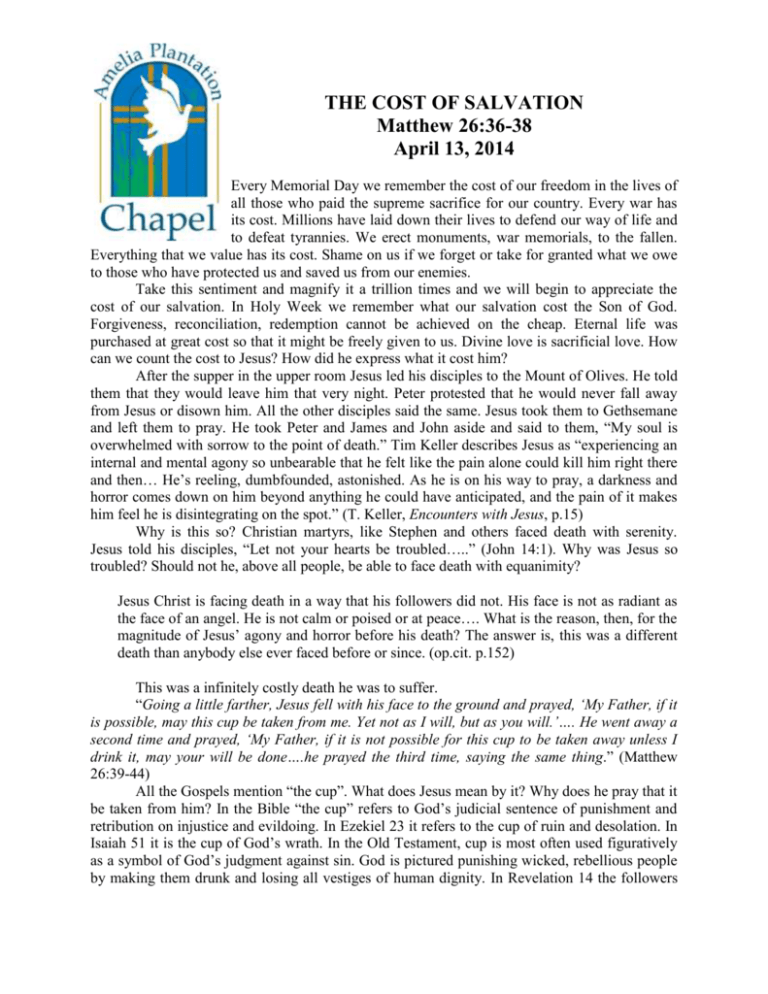2014-04-13 THE COST - Amelia Plantation Chapel
advertisement

THE COST OF SALVATION Matthew 26:36-38 April 13, 2014 Every Memorial Day we remember the cost of our freedom in the lives of all those who paid the supreme sacrifice for our country. Every war has its cost. Millions have laid down their lives to defend our way of life and to defeat tyrannies. We erect monuments, war memorials, to the fallen. Everything that we value has its cost. Shame on us if we forget or take for granted what we owe to those who have protected us and saved us from our enemies. Take this sentiment and magnify it a trillion times and we will begin to appreciate the cost of our salvation. In Holy Week we remember what our salvation cost the Son of God. Forgiveness, reconciliation, redemption cannot be achieved on the cheap. Eternal life was purchased at great cost so that it might be freely given to us. Divine love is sacrificial love. How can we count the cost to Jesus? How did he express what it cost him? After the supper in the upper room Jesus led his disciples to the Mount of Olives. He told them that they would leave him that very night. Peter protested that he would never fall away from Jesus or disown him. All the other disciples said the same. Jesus took them to Gethsemane and left them to pray. He took Peter and James and John aside and said to them, “My soul is overwhelmed with sorrow to the point of death.” Tim Keller describes Jesus as “experiencing an internal and mental agony so unbearable that he felt like the pain alone could kill him right there and then… He’s reeling, dumbfounded, astonished. As he is on his way to pray, a darkness and horror comes down on him beyond anything he could have anticipated, and the pain of it makes him feel he is disintegrating on the spot.” (T. Keller, Encounters with Jesus, p.15) Why is this so? Christian martyrs, like Stephen and others faced death with serenity. Jesus told his disciples, “Let not your hearts be troubled…..” (John 14:1). Why was Jesus so troubled? Should not he, above all people, be able to face death with equanimity? Jesus Christ is facing death in a way that his followers did not. His face is not as radiant as the face of an angel. He is not calm or poised or at peace…. What is the reason, then, for the magnitude of Jesus’ agony and horror before his death? The answer is, this was a different death than anybody else ever faced before or since. (op.cit. p.152) This was a infinitely costly death he was to suffer. “Going a little farther, Jesus fell with his face to the ground and prayed, ‘My Father, if it is possible, may this cup be taken from me. Yet not as I will, but as you will.’…. He went away a second time and prayed, ‘My Father, if it is not possible for this cup to be taken away unless I drink it, may your will be done….he prayed the third time, saying the same thing.” (Matthew 26:39-44) All the Gospels mention “the cup”. What does Jesus mean by it? Why does he pray that it be taken from him? In the Bible “the cup” refers to God’s judicial sentence of punishment and retribution on injustice and evildoing. In Ezekiel 23 it refers to the cup of ruin and desolation. In Isaiah 51 it is the cup of God’s wrath. In the Old Testament, cup is most often used figuratively as a symbol of God’s judgment against sin. God is pictured punishing wicked, rebellious people by making them drunk and losing all vestiges of human dignity. In Revelation 14 the followers of the beastly opponent of God “will drink the wine of God’s fury, which has been poured full strength into the cup of his wrath.” (Revelation 14:10) The sorrow of Jesus in the garden grows from the prospect of feeling the full weight of his Father’s anger against sin falling upon himself. He alone of all humanity does not deserve such judgment, yet he freely chooses to drink the cup so that all people can receive forgiveness. As the soldiers come to arrest him, obedience and heroism causes him to say, “Shall I not drink the cup the Father has given me?” (John 18:11) The reason death was so difficult for Jesus is that he alone realized that he was about to experience the full divine judgment on the evil and sin of humanity. He was to take upon himself the judgment we deserved. What did that judicial punishment feel like? Keller says that it is “the torture of divine absence.” If the essence of sin is the rejection of God – of not wanting God to have first place in our lives – the essence of God’s judgment is to honor our choice. God gives us what we ask for. But since we are made for God, and in him we live and move and have our being, and no one on earth is completely cut off from him, we cannot live without the life and love and light of God however limited that may be for us now. Even though we may not acknowledge the God of the Bible, he is still upholding our lives in ways we cannot see. And what would happen if God were to truly remove his gracious sustaining power from our lives? It would be a kind of spiritual agony and disintegration that would go on forever, since our souls are built for his love and presence. It would be eternal torment and perfectly just… If you want freedom from God, you will quite justly get what you hope for. And it will be torment. (op.cit. p.154) But if you are Jesus, who lives in constant close communion with his Father, whose love radiates through his being, who is the light of the world and the bringer of life in all its divine fullness, the prospect of being separated from the Father is like drinking a poison that sears his being with infinite pain. He looks into the abyss of the Cross and sees the severing of his eternal life’s principal relationship – the forsakenness of the cry of dereliction: “My God. My God, why have you forsaken me!” He begins to experience the incredible agony of being cut off from the Father so that we should not have to endure it. Jesus was going to lose for a time that intimate communion with the Father on our account. He took our place. His was the sacrificial substitute for our sins. He began to grasp in the garden what he was about to endure on the Cross. At this moment in the garden of Gethsemane Jesus could have refused to drink the cup. He could have declined to take our punishment upon himself. He could have escaped bearing the judgment for the sins of the world. He could have left us to stew in our own juice. But he accepted the will of God for his life and death, for our sake. He died in agony so that we might live in joy. Imagine what it is like to lose someone you love and have lived with in an intimate relationship most of your life. When they die they leave an absence in your life that nothing and no one can fill. Your grief is inconsolable. Imagine that grief and pain and sorrow magnified a trillion times, an infinite amount, and you will begin to understand the cost of our salvation. God goes through hell to give us heaven. Therefore there is no gratitude too much or too deep for us to feel toward Jesus, who out of love for us, took our place of punishment so that we might be saved, rescued, delivered from the judgment we deserved. He won for us, at great cost, “the glorious freedom of the children of God.” (Romans 8:21)









